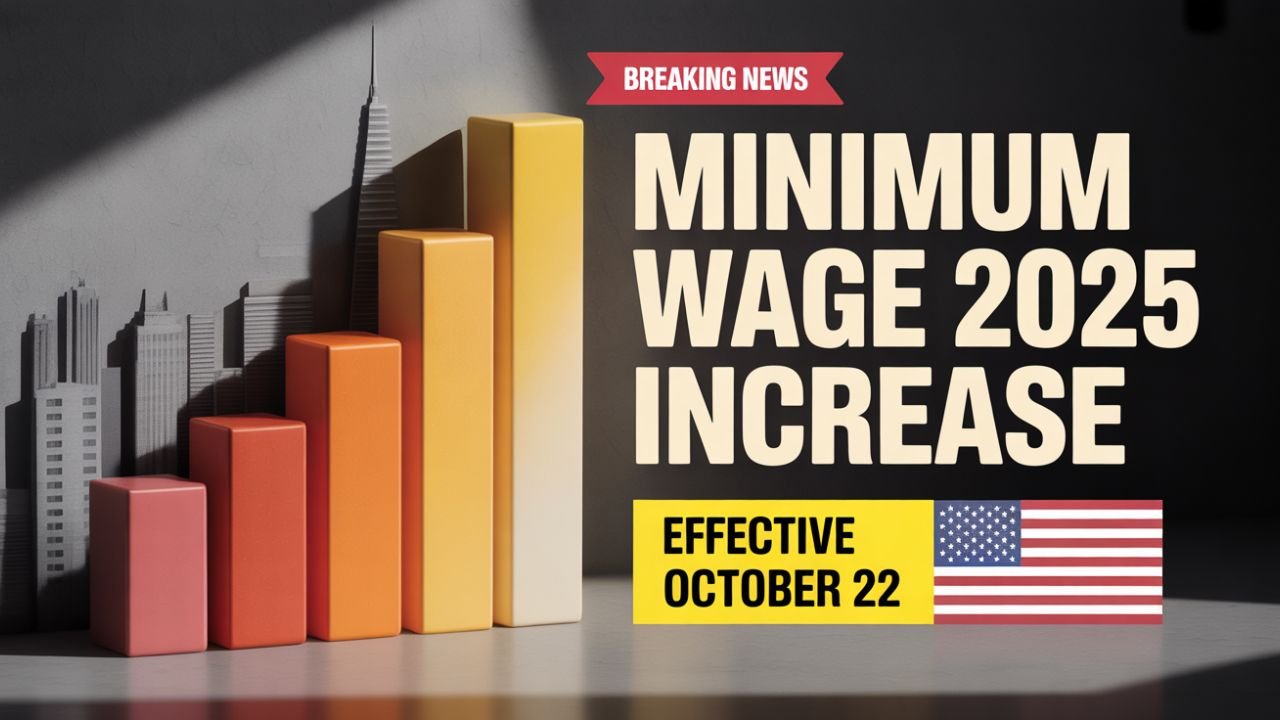U.S. Minimum Wage Increase 2025: New Hourly Pay Rates Effective October 22The year 2025 is going to be very important for the workers in Florida, millions of them, to be exact. At this moment, the minimum wage in the state government has been raised from $13 to $14 per hour, which will be enforceable starting September 30, 2025. This change is a part of a constitutional amendment that was passed by voters in the year 2020. To be more precise, according to the plan, the minimum wage in Florida will go up by $1 every year until it finally gets to $15 per hour in 2026.
The whole movement for this wage increase with the lawyers of the fame, namely, John Morgan, and of the costs of living that have increased considerably—housing, food, healthcare, and transport—arguing that the workers must be paid more for what they do.
Florida’s Minimum Wage Increase Program (2021–2026)
The Florida government has established a systematic and phased wage increase plan that will increase the minimum wage by $1 each year. This program began in 2021 and will continue through 2026. After that, wage rates will automatically adjust for inflation.
| Year | Standard Minimum Wage | Base Pay for Tipped Employees |
|---|---|---|
| 2021 | $10.00 | $6.98 |
| 2022 | $11.00 | $7.98 |
| 2023 | $12.00 | $8.98 |
| 2024 | $13.00 | $9.98 |
| 2025 | $14.00 | $10.98 |
| 2026 | $15.00 | $11.98 |
This table clearly shows that workers’ incomes in Florida are steadily increasing each year, improving their economic situation.
Relief for Service Sector Workers
This wage increase isn’t limited to non-managerial employees; it will also directly benefit tipped employees—such as those working in restaurants, hotels, bars, and cafes.
In 2025, the base pay for these employees will increase from $9.98 to $10.98 per hour. By law, if an employee’s total income (base pay plus tips) falls below $14 per hour, the employer must cover the difference.
For example:
If a waiter receives a base pay of $10.98 and a tip of $2 (totaling $12.98), the employer would have to pay an additional $1.02 to bring their total income to $14 per hour.
Main Reasons for Raising the Minimum Wage
- Continuously Rising Inflation:
In recent years, the prices of food, rent, fuel, and healthcare have steadily risen. This has made wage increases necessary to ensure workers’ living standards are not impacted. - Public Support:
In the 2020 referendum, a majority of Florida citizens supported this plan. This proves that this is not just a government decision, but the result of public will. - Protection for Service Sector Workers:
Tip-dependent workers face unstable incomes. Therefore, a fixed base salary provides them with financial stability and security.
Benefits of a $14 per hour wage
1. Increased Additional Income
A full-time employee working 40 hours per week will earn approximately $160 extra monthly and approximately $2,000 annually.
2. Life Stability
This additional income will help cover expenses like rent, food, health insurance, and education, making employees’ lives more secure and balanced.
3. Protection for Tip-Based Employees
Even if tips are low in a given month, employees will still receive a guaranteed $14 per hour. This will reduce the risk of uncertainty about their income.
Employers’ Responsibilities
All Florida employers are required to comply with this new rule. They must take the following steps:
- Display a new wage poster at the workplace.
- Updating the new rates in the payroll system.
- Maintaining transparency in the wages of tipped employees.
If an employer violates these rules, they may face fines or legal action.
Why the 2025 Wage Increase is Important
This salary hike is not just about money; it marks the turning point for social and economic reforms. The change is especially important for those who have been relying on very low incomes for a long time.
A lot of people in the service industry, including waiters, bartenders, and hotel personnel, will now have a more secure financial situation. The change in 2025 will see them receiving a minimum of $10.98 per hour instead of the current $9.98, and if their total income is less than $14, their employer will be obliged to pay the difference.
This new law will not only lift the employees’ living standards but also create a more vibrant economy in the state. The reason is simple: increased worker purchasing power would lead to more spending, which would, in turn, be advantageous for the local merchants.
Conclusion
Florida’s plan to gradually raise the minimum wage is a great leap forward in the direction of economic justice and social equality. With inflation consistently going up, millions of workers will be helped, and thus, the policy will bring relief and stability.
The 2025 event is not merely a dollar figure but rather a promised acknowledgment of the struggle and the rights of those who are the backbone of the state’s economy. When the rate of $15 per hour is attained in the next few years, Florida will be characterized as the most considerate and just state towards its labor force.
FAQs
Q1. When will Florida’s new minimum wage take effect?
The new $14 per hour minimum wage will take effect on September 30, 2025.
Q2. What is the minimum wage for tipped employees in 2025?
It will increase from $9.98 to $10.98 per hour.
Q3. Will the wage increase continue after 2026?
Yes, after 2026, the rate will be adjusted annually based on inflation.
Q4. Who started the Florida minimum wage increase campaign?
The initiative was led by lawyer John Morgan.
Q5. What happens if an employer doesn’t comply?
Employers who fail to follow the new wage law may face fines or legal action.
